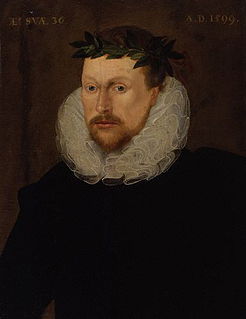A Quote by Johann Wolfgang von Goethe
He who does not stretch himself according to the coverlet finds his feet uncovered.
Related Quotes
He who asks to receive his daily bread does not automatically receive it in its fullness as it is in itself: he receives it according to his own capacity as recipient. The Bread of Life (cf. Jn. 6:35) gives Himself in His love to all who ask, but not in the same way to all; for He gives Himself more fully to those who have performed great acts of righteousness, and in smaller measure to those who have not achieved so much. He gives Himself to each person according to that person's spiritual ability to receive Him.
A man who finds himself among others is irritated because he does not know why he is not one of the others. In bed next to a girl he loves, he forgets that he does not know why he is himself instead of the body he touches. Without knowing it, he suffers from the mental darkness that keeps him from screaming that he himself is the girl who forgets his presence while shuddering in his arms.
Whenever the truth is uncovered, the artist will always cling with rapt gaze to what still remains covering even after such uncovering; but the theoretical man enjoys and finds satisfaction in the discarded covering and finds the highest object of his pleasure in the process of an ever happy uncovering that succeeds through his own efforts.
Let no one imagine that he will lose anything of human dignity by this voluntary sell-out of his all to his God. He does not by this degrade himself as a man; rather he finds his right place of high honor as one made in the image of his Creator. His deep disgrace lay in his moral derangement, his unnatural usurpation of the place of God. His honor will be proved by restoring again that stolen throne. In exalting God over all, he finds his own highest honor upheld.
The fact that labour is external to the worker, i.e., it does not belong to his intrinsic nature; that in his work, therefore he does not affirm himself but denies himself, does not feel content but unhappy, does not develop freely his physical and mental energy but mortifies his body and his mind. The worker therefore only feels himself outside his work, and in his work feels outside himself.
A tough manager will have realistic quotas for his employees that he keeps to himself and aggressively stretch quotas, anywhere from ten percent higher to a lot more, which he imposes on his staff. If his people miss the stretch numbers but exceed the realistic goals, he's happy. If he's a superb manager, he knows how far they can stretch without breaking.
Here when the labouring fish does at the foot arrive, And finds that by his strength but vainly he doth strive; His tail takes in his teeth, and bending like a bow, That's to the compass drawn, aloft himself doth throw: Then springing at his height, as doth a little wand, That, bended end to end, and flerted from the hand, Far off itself doth cast. so does the salmon vaut. And if at first he fail, his second sommersault He instantly assays and from his nimble ring, Still yarking never leaves, Until himself he fling Above the streamful top of the surrounded heap.
But he found that a traveller's life is one that includes much pain amidst its enjoyments. His feelings are for ever on the stretch; and when he begins to sink into repose, he finds himself obliged to quit that on which he rests in pleasure for something new, which again engages his attention, and which also he forsakes for other novelties.
A Godly leader ... finds strength by realizing his weakness
finds authority by being under authority
finds direction by laying down his plans
finds vision by seeing the needs of others
finds credibility by being an example
finds loyalty by expressing compassion
finds honor by being faithful
finds greatness by being a servant
If you punish a child for being naughty, and reward him for being good, he will do right merely for the sake of the reward; and when he goes out into the world and finds that goodness is not always rewarded, nor wickedness always punished, he will grow into a man who only thinks about how he may get on in the world, and does right or wrong according as he finds advantage to himself.
Man never ceases to seek knowledge about the objects of his experiences, to understand their meaning for his existence and to react to them according to his understanding. Finally, out of the sum total of the meanings that he has deduced from his contacts with numerous single objects of his environment there grows a unified view of the world into which he finds himself "thrown" (to use an existentialist term again) and this view is of the third order.






































